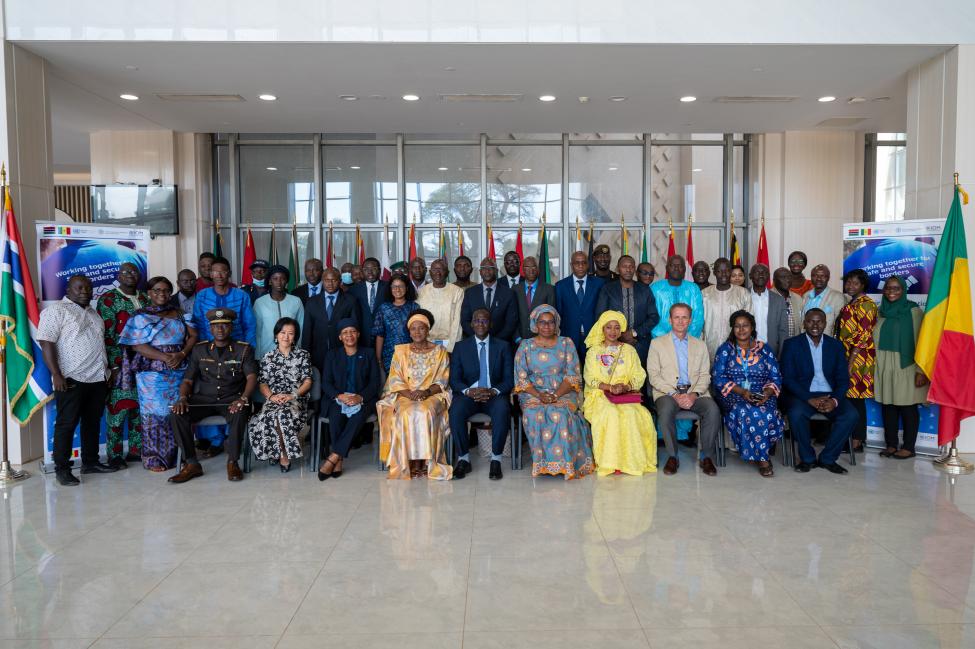-
Who We Are
WHO WE AREThe International Organization for Migration (IOM) is part of the United Nations System as the leading inter-governmental organization promoting since 1951 humane and orderly migration for the benefit of all, with 175 member states and a presence in over 100 countries. IOM has had a presence in The Gambia since 2001.
About
About
IOM Global
IOM Global
-
Our Work
Our WorkAs the leading inter-governmental organization promoting since 1951 humane and orderly migration, IOM plays a key role to support the achievement of the 2030 Agenda through different areas of intervention that connect both humanitarian assistance and sustainable development.
- Data and Resources
- Take Action
- 2030 Agenda
New IOM, FAO Project Aims to Promote Cross-Border Cooperation, Resilience Between The Gambia and Senegal
Banjul – On November 22, the International Organization for Migration (IOM) and the Food and Agriculture Organization of the United Nations (FAO) launched a new project entitled “Supporting Cross-Border Cooperation for Increased Community Resilience and Social Cohesion in The Gambia and Senegal,” with financial support from the United Nations Peacebuilding Fund (PBF). As the first UN PBF funded cross-border project to be implemented between The Gambia and Senegal, the two-year, USD 3.8 million project aims to address the causes of instability and conflict in border communities, while promoting community resilience and social cohesion.
A UN joint rapid assessment in 2021 identified a number of key conflict issues along The Gambia’s and Senegal’s porous, 749 kilometre-border, including the smuggling of migrants, trafficking in persons and nascent border management practices. Environment-related challenges were further emphasized, with communities impacted by climate change, deforestation, illegal logging, and weak natural resource management, among others.
“The Gambia and Senegal enjoy a long standing relationship that is anchored on close cultural, social and family ties,” explains Salimata E. Touray, Secretary General and Head of the Civil Service in The Gambia. “This project will further strengthen the partnership and create greater social cohesion among communities along our shared borders.”
The project’s objectives, therefore, are three-fold:
1) build trust and engagement between communities and border authorities for improved border management;
2) improve cross-border natural resource management through a community-based participatory approach;
3) enhance community resilience through inclusive dialogue and green livelihoods.
Planned activities include capacity building and infrastructure support for border officials, cross-border community engagement, joint identification of solutions to deforestation, and the introduction of climate-resilient strategies for diversified livelihoods. “We hope implementation of the project will contribute to reducing the effects of cross-border crime within local communities, centered around uncontrolled deforestation at the expense of agriculture and livestock,” says Major General Mbaye Cisse, Chief of Staff of the Office of the President.
IOM and FAO will work in close collaboration with both countries’ ministries of environment and interior, as well as community partners. The project activities will be implemented until December 2023 in nine communities across four main cross-border areas.
For more information:
IOM In Banjul: Robert Kovacs (publicinfogambia@iom.int)
In Dakar: Adama Dia (+221 33 869 62 00, adia@iom.int)
FAO In Banjul: Gopi Kharel (+220 5026720, Gopi.Kharel@fao.org)
In Dakar: Lala Ndiaye, (+221 77 533 99 27, Lala.Ndiaye@fao.org)
